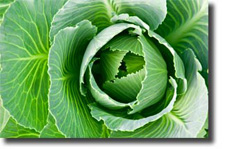Cabbage Nutrition

Facts about Cabbage Nutrition
People all over the world eat cabbage everyday just for the cabbage nutrition. Along with its great taste cabbage has so many beneficial properties that it is a staple in many diets. In the United States people eat Cole slaw as a substitute for salads and in Asia many people eat the cabbage based dish Kim Chi everyday for its health benefits. In fact, Asian people claim that they live longer lives and appear younger and thinner because they eat Kim Chi everyday.
Cabbage is a leafy, green vegetable that resembles a head of lettuce. The leaves are a denser and lighter in color but cabbage are related to lettuce, broccoli and cauliflower. There are 2 different types of cabbage, the lighter colored, mild flavored crinkly leafed Savoy and the heavier deep red burgundy colored red cabbage. They all have the same beneficial cabbage nutrition.
Cabbage contains many different vitamins and minerals. Vitamins C, riboflavin, niacin and vitamin B6 can all be found in a serving of cabbage. These particular vitamins can act as antioxidants and prevent things like irregular heart beats and strokes. They can help break down fats and fatty acids to make them more digestible. They can also help cleanse the body and prevent kidney stones and regulate blood pressure.
Other vitamins in cabbage include vitamin K, vitamin A, and Foliates. These vitamins are known to protect the heart, control cholesterol and help to maintain insulin blood levels. This can help prevent diabetes. But perhaps, one of the most important things these vitamins do is to prevent diseases like cancer. Any leafy vegetable contains cancer fighting agents and can even help people who have had cancer in the past.
Omega 3 acids are also a part of cabbage nutrition. Many cultures who consume a lot of Omega 3 acids are known to have little or no cardiovascular diseases or high blood pressure. Younger children can also benefit from eating cabbage because it promotes healthy development of the nerves, brain and eyes. Omega 3 has also been praised for helping with depression. It can raise serotonin levels to promote a good feeling and it can be used to help women who are experiencing hormone level drops. During this time, a woman may become depressed and unsure about what is happening with her body. Omega 3 helps in this situation and can boost a mood if consistently used.
Cabbage is naturally low in fat. If no heavy condiment is used with cabbage it is only 25 calories a serving. It contains a large amount of fiber which is beneficial for digestive health to maintain a healthy weight. Although it is low calorie, it also contains carbohydrates. But since the calorie count is so low, the carbohydrates simply give the person more energy throughout the day. A lot of healthy carbohydrates also can help people control their appetites because they no longer feel like they need to eat, even hours after consuming them. Because of this fact, eating cabbage is a smart choice while dieting.
Although cabbage is loaded with vitamins cabbage nutrition can also help other health ailments. Women with extreme cases of post menstrual syndrome and menopause issues who eat cabbage on a daily bases can get relief from their symptoms. Cabbage has an amount of natural estrogen found in many vegetables.
People who suffer from breathing difficulties or asthma seem to do better when they eat cabbage and even depressed people can be cured by eating it. The vitamins associated with cabbage naturally raise serotonin levels to make a person happier.
Eating cabbage everyday is a great way to get most of your daily vitamins in one small, low calorie serving.